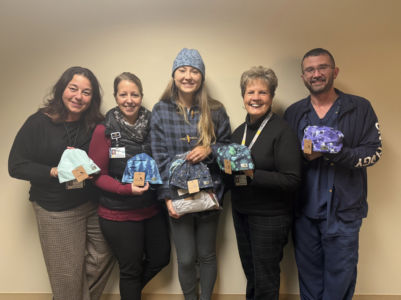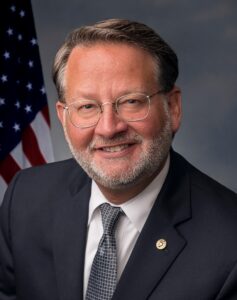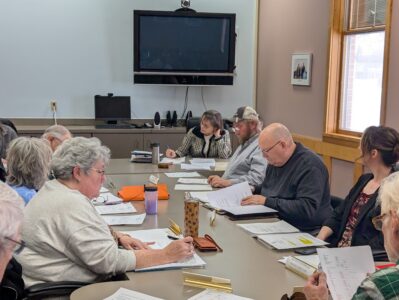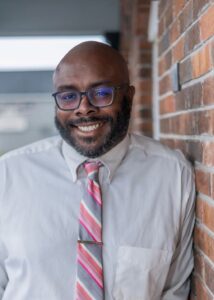UPDATED: From Nigeria to Michigan: Two pastors and their experience of religious persecution

News Photo by Reagan Voetberg Rev. Aloysius Okpala and Rev. Emmanuel Finbarr, parochial vicar and lead pastor at All Saints Catholic Parish respectively, are pictured in Finbarr’s office on Thursday. Both had been the recipient of religious persecution before coming to Alpena.
ALPENA — In the United States, the freedom of religion written into our constitution protects us from the worst forms of religious persecution, but countries with unstable governments or violent extremist groups, among other reasons, may not be able to defend that right for their people.
For Christians in Nigeria, especially in the northeast part of the country, the threat of persecution is a daily reality. Two pastors in Alpena–Rev. Emmanuel Finbarr and Rev. Aloysius Okpala–have experienced it firsthand.
Finbarr and Okpala are the pastors of All Saints Catholic Parish in Alpena. A relationship between their diocese in Nigeria, the Diocese of Maiduguri, and the Diocese of Gaylord, which extends to Alpena, has brought them both to Northeast Michigan. Finbarr has pastored at Catholic churches across the diocese for about ten years, and Okpala came to the diocese in 2023.
A diocese in the Roman Catholic Church is an organization or district of catholic parishes led by a bishop.
Both Finbarr and Okpala felt a call to become Catholic priests at a young age. Finbarr comes from a family with 12 siblings, and Okpala from a family with five siblings.
Finbarr went through seminary from 1988 to 2002 in Nigeria and was ordained a priest in 2002. He was assigned to be the pastor of a parish in Gamboru Ngala, a border town in northeast Nigeria, in 2006. He was still pastor there when Boko Haram first began their attacks on Christians in 2009.
Boko Haram, which means “western education is forbidden,” according to the U.S. Department of National Intelligence’s counter terrorism guide, is a Nigerian terrorist group which seeks to overthrow the current Nigerian government and replace it with a regime based on Islamic law.
“July 26, 2009, that was the official day we knew those people started…all the crisis in the northeastern part of Nigeria,” Finbarr said.
Finbarr described the night that his parish was attacked in 2009.
“They attacked at night,” he said. “We narrowly escaped, myself, my seminarian, and the steward, the cook. When we came back the next day, the church was burned down, and the house wasn’t burned down, but it was destroyed. Broke through the doors and ransacked the whole house.”
All the churches on the street were burned down that night, about six of them, Finbarr said. Since the town was predominantly muslim, all the churches were in the same area. He was the only pastor living on church premises at the time.
Government offices, like the immigration, police, and army offices, were also burned down, he said, and those that were on duty were killed.
After the attack, Finbarr left town and went to another part of the diocese for about 10 days. When he returned, he stayed at the parish on and off, moving around so his location could not be pinpointed. Part of the church was fixed so that services could be held.
Finbarr was transferred by his bishop to a parish where he oversaw a catechetical school. He said they had to take turns keeping a watch there every night in case of attacks.
Finbarr said things calmed down for a while until 2014. That was the year he came to the U.S.
Okpala was ordained a priest in 2013, also in the Diocese of Maiduguri. Before he was ordained, he worked for some time at the same parish in Gamboru Ngala that Finbarr did, but after Finbarr had left. That was in 2010 or 2011, Okpala said. At that point, Boko Haram’s tactics had changed from burning down buildings to targeting individuals. Due to that threat, Okpala had to leave town.
He worked as an assistant parish priest in Shuwa, also in Northeast Nigeria, that in around 2013 was attacked.
“So 2013, 2014, when we were sacked, the seminary was also in the town, and a lot of people were killed,” Okpala said. “The seminary…part of it was burned. That happened in March, or in February. So people ran away, they came back, as they came back we continued our life, but in August of the same year, that was when they took over the town.”
The bishop had to send Okpala and the other priests to different dioceses in Nigeria. Okpala was sent to northwest Nigeria for about four or five months until Boko Haram was pushed back into the forests, he said.
Okpala said when the attacks first started, Boko Haram was targeting Christians, but as time went on, others were killed as well due to explosives being planted in busy public areas. There were also what Okpala called suicide bombers, people who would wear explosives and detonate them in a busy area.
Okpala said that now, Boko Haram has expanded to other parts of Nigeria, and not just the northeast.
“It has, you know, made life for so many people very unbearable,” he said. “The farms have been taken over by the insurgents…people who go to farm and they can’t come back because they’ll be killed or they will be kidnapped. Sometimes ransom will be paid before they are out, and sometimes you’ll never see them again.”
“It’s something that started as a target on Christians but I think it’s affecting everybody now.”
Now, Finbarr and Okpala have found a home in Alpena, although not without experiencing cultural differences.
Finbarr noted the individualistic culture of people in the U.S. Where he comes from, he could walk over to a friend’s house and visit without planning it ahead of time. People are much more private here, he said, and tend to keep to themselves. When there’s a wedding or funeral in Nigeria, there aren’t formal invites. The whole community just shows up.
Even so, Finbarr said that Americans are friendly and welcoming in his experience.
“Anybody that knows that you are a stranger tries to help,” Finbarr said. “All the parishes where I’ve worked I think with deep gratitude of their kindness. They have been so supportive, so helpful.”
“The culture here is very accommodating, is very warm, is very welcoming,” Okpala said. “People always will want to know you, they will ask personal questions about your family, where you’re coming from. So there is that desire to know who you are…It’s a feeling of like, well, I’m away from home but yeah, I still have a home.”
Through it all, Finbarr and Okpala are dedicated to ministering where God has called them.
“We continue to pray that God will help us in whatever we do here,” Finbarr said.
Reagan Voetberg can be reached at 989-358-5683 or rvoetberg@TheAlpenaNews.com.
This story has been updated to reflect that Rev. Aloysius Okpala came to the Diocese of Gaylord in 2023. <\i>




